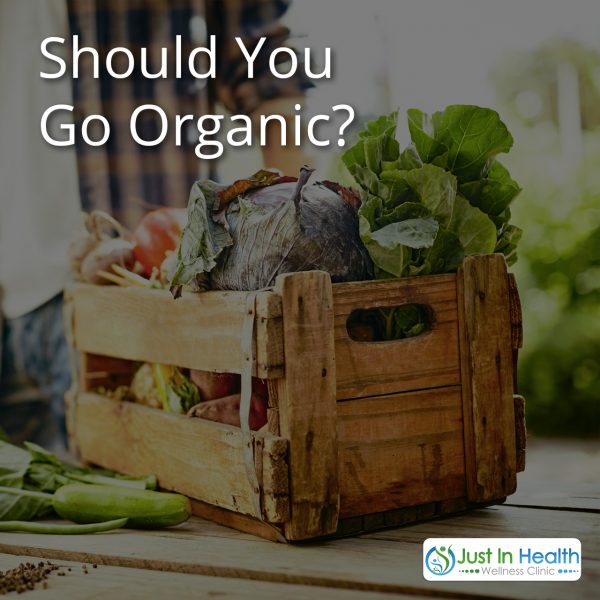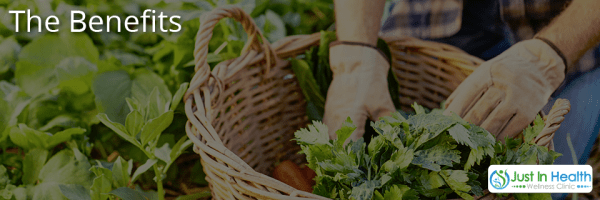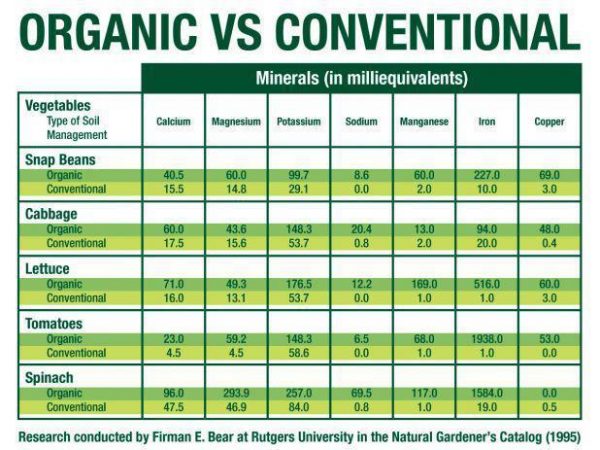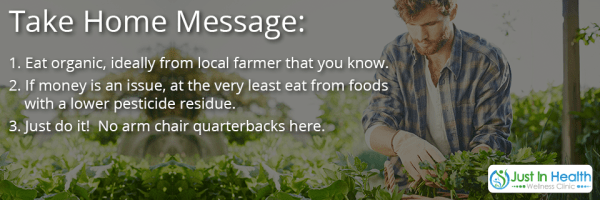

By Dr. Justin Marchegiani
Buying organic food has become trendy, but is being a trend all that there is to it? Today we’re going to dive deeper into what organic really means, and if it’s worth converting to.
If you’re going to spend extra money for an organic sticker on your produce, you should know what that word really means. Organic food is food grown without pesticides, herbicides, fungicides, and is GMO free.
“100% Organic” is exactly that; each ingredient as well as all facilities involved are Certified Organic.
“Organic” is at least 95% organic ingredients.
“Made with organic ingredients” must contain at least 70% organic ingredients.
You can also try getting to know local farmers in your area and ask about their farming practices. You might be surprised to find many smaller farmers adhere to organic practices, but don’t pay for the organic certification. Becoming certified organic is both time consuming and expensive, so sometimes smaller farmers won’t have gone through the process of getting the official seal, despite their food being just as good!
Organic meat refers to animals that meet the requirements set by the government. These animals haven’t been injected with antibiotics, are fed organic food, and are allowed outdoor access.
As per the USDA, these animals are:
-“Allowed year-round access to the outdoors except under specific conditions (e.g., inclement weather).
-Raised on certified organic land meeting all organic crop production standards.
-Raised per animal health and welfare standards.
-Fed 100% certified organic feed, except for trace minerals and vitamins used to meet the animal’s nutritional requirements.
-Managed without antibiotics, added growth hormones, mammalian or avian byproducts, or other prohibited feed ingredients (e.g., urea, manure, or arsenic compounds).”
However, it is important to note that although these animals are required to be fed organic food, they can still be fed unnatural food (such as chickens being fed soy and flax, and cows being fed grains). It’s important to know what is natural for a given animal’s diet, organic or not. If an animal isn’t designed to consume what its being fed, the animal won’t be as healthy for you to eat as it could have been. For this reason, I recommend buying meat from animals that were fed their natural diet, such as grass-fed beef.
Remember, healthy animals help make a healthy you. It’s virtually impossible to consume sick and toxic animals and plants and expect to create health out of it. Said another way, you can’t make chicken salad out of chicken crap.

Going organic is definitely worth the small price difference, especially considering how much money you will be saving down the road! Staying healthy will keep you out of the doctor’s office and help you avoid having to buy all sorts of scary medications later in life.
By going organic, you’re saving your body from all the toxins used in conventional farming. That alone is a huge plus! Research also shows a robust increase in nutritional value when comparing organic food to non-organic.
Click here to learn more about the benefits of going organic.
The pesticides and other chemicals that are used in conventional farming have a terrible effect on the microbiota and minerals that are present in the soil. Plants can only be as healthy as the soil, so healthy soil=healthy plants that taste good and are nutritionally dense.
There is a great deal of misinformation put out there by huge multi-billion dollar corporations, which don’t have any problem putting hundreds of thousands of dollars into advertising and propaganda to push their agenda. They want us to believe that conventional food and even genetically modified food is just as good as organic, which is just plain false. Numerous studies have proven otherwise. Pay attention to who pays for a study to be conducted- you might notice that any studies promoting GMOs and pesticides are funded by someone with an agenda to push…

Cool Story… Did you know that researchers at the University of Florida found that in the Everglades, female alligators weren’t reproducing at a normal rate due to the severe reduction in size of their male alligators’ genitalia? All the males reading this post, I hope I have your attention by now!
When the male alligators’ blood was drawn, their estrogen levels were nearly the same as the female alligators’ levels. Researchers have attributed the pesticide runoff to the insane spike in estrogen because of its xeno-estrogens (estrogen-like effects). These synthetic estrogens play a major role in infertility, decreased libido and muscle mass in men and women alike.
You may have heard of men growing breasts from drinking soy milk- that would be due to the xenoestrogens.
PS: These same estrogen’s are also found in plastics too. If you are drinking or eating out of plastic containers, you may want to switch to glass or stainless steel containers.
 :
:Eat organic, even non-certified from a local farmer. If money is an issue, at the very least eat from foods with a lower pesticide residue. Check out this list from the EWG which categorizes foods by the lowest and highest level of pesticide residue. Avoid the high residue plants and consume the low residue ones.
Need help going organic? Click here!
References:
The Disappearing Male (Documentary)
https://www.ams.usda.gov/sites/default/files/media/Organic%20Livestock%20Requirements.pdf